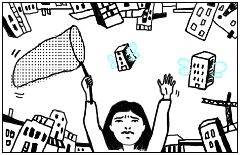
Every August, the real battles in the Lower Mainland are not for the best camping spots but for the best rental apartments. Fighting is fierce for any September 1st move-in, the most coveted date of the rental calendar. And this year it's tougher than ever. The increasing demand for accommodations in the "best city on Earth" coupled with the decreasing supply of affordable housing has led to higher rental prices and a less-than-one per cent vacancy rate. And this weekend is the climax of these Survivor-like contests for what is often dark, dingy and expensive square footage.
I know, because I'm one such survivor. Fresh off the boat from a four-month sojourn in Asia, I attended my first apartment viewing only three heady days into August. Its Craigslist ad promised a location only minutes from the beach. After a leisurely walk over, my idyllic summer evening turned quickly into a battleground scene. Dozens of flip-flopped, lululemon'ed denizens milled about the front grounds of a building in one of the most prized postal-codes in the city. For them, Beverly Hills 90210 means nothing, nor does the rent-controlled lower-eastside in Friends. These lotus-eaters' fabled Shangri-las are Kitsilano, the West End and Commercial Drive. And to nab those coveted 1 or 2BR suites, Vancouverites often resort to bribery and bidding wars, lies and fists-full of cash.
It's a difficult quest. Yesteryear's simple one-page applications have turned into full rental portfolios including statements of introduction, full CVs, letters of reference, and letters of good credit standing. "That's more information than a job application!" said one friend when I told her.
But often rental applications can involve much more. A year ago, a colleague beat 25 other applicants for a "character" suite on Commercial Drive by offering the landlord $100 a month over asking price. She got the place. This month, she and her boyfriend beat out 40 other applicants for a two bedroom without bribery. She said in this case she got the place because the open house was swarming with babies, large groups of roommates and people with dogs: the new untouchables.
"Good luck if you're young, white and male," added a twenty-six year old male colleague. "No one wants to rent to single guys. The thing that saved me was that I was a grad student and the landlord was a prof." He suggested I emphasize my affirmative-action credentials.

How to win landlords and influence people
With that in mind, I joined forces with a friend to increase my odds (as a medical student, she has more pull in the rental market than I, a lawyer-turned-journalism student). And when I wrote an e-mail describing us as "mature, grad-students, responsible and allergic to pets and loud-noise," Elana added "neat, quiet and Asian females," hoping to reap the benefits of reverse discrimination.
As our search continued, it became clear to me that the apt-hunt is closer to online dating than a job interview, complete with wardrobe strategy and breath mints. Both the tenant and landlord know that their one-year lease ties them to a rental relationship longer than many romantic ones. That being so, personal factors are key to "winning" the apartment. For example, we learned to size up the landlord from the Craigslist description and tailor the intro-emails (humorous, serious, short, long, literary, factual) and level of follow-up communication to suit. The downside is of course these strategies are close to a crap-shoot and each rejection feels personal: i.e. it wasn't the application, he's just not that into you.
Finding a good roommate situation is even more fraught with personal landmines. Three weeks into August, I learned this the hard way when Elana quit our search. Her parents were determined to prevent her from moving out because living on her own would make it much easier for her to see her new boyfriend who is, gasp, white and vegetarian. Obedient to her parents' wishes and conscious of their financial contribution to her education, Elana bailed out, describing our rental search as a failed blind date. A friend's cool response to this latest turn of events was simply, "Why weren't you looking for your own place (as a fall-back) while you were searching with her?" Apparently, honesty and fidelity are virtues besmirched in both romantic and rental endeavours.
A lesson or two from our southern neighbours
These sorts of situations and ruminations run more rampant when there's a crunch. And this back-to-school rental crunch is particularly bad because it's layered upon an "extremely" tight rental market, according to Andrew Ramlo of Urban Futures, a consulting firm on population, development and land use issues. Vancouver's less than one per cent vacancy rate is far below the three per cent "structural" level, needed for rental exchange.
Why? Ramlo says the young mobile labour force migrating into "the best city in the world" is partly responsible for creating extremely high demand. And while in the 1960s and 1970s, "purpose-built rentals" used to be subsidized by the government (i.e. the three and four storey walk-ups in Kitsilano and the West End), that's now far from the case. Rising land prices and government inaction in the 1980s ended this policy, and currently, 40 to 60 per cent of the new condominium developments are investor-owned and their rental units are market-driven, keeping pace with rising housing prices.
The City's current philosophy is that the rental housing crisis can be alleviated by secondary suites (i.e. basement suites) or condo developments that allow rental units, according to Penny Gurstein, director of the School of Planning at UBC. But this has not lead to an affordable housing solution, so positions for firemen, police, and civic workers remain unfilled. As it stands, finding housing in Vancouver is not a reality, unless family income is above $120,000. And Gurstein says she sees little change in sight.
All levels of government are to blame, according to Tom Durning from TRAC, for failing to cooperate with each other to build a workable national policy on housing issues. Durning says municipal governments need to work together to build a regional planning body that can mend a "too-fractured system."
He says governments are also to blame for not learning from the U.S. American "workforce housing" programs that use a variety of public-private partnership solutions to provide affordable housing, for say, workers who earn 80% of the median income or for civic workers such as teachers and nurses.
"The United States, although constantly misconstrued by the left-liberal coffee-house 'progressives' in Vancouver as 'right-wing' is in fact one of the more progressive places in terms of affordable housing programs," according to Howard Rotberg who has written extensively about rental housing issues. The U.S. has everything from transferable affordable housing tax credits issued to affordable housing developers who sell them to provide early stage financing, to dedicated affordable housing mutual funds. He says B.C. (and Vancouver in particular) is in fact one of the least progressive jurisdictions in North America.
But Ramlo is hesitant about U.S.-style market interventions like giving tax breaks to renters similar to those currently given to homeowners. He argues that if tax breaks are given to renters, there will be a market inducement for landlords to raise the rent in response.
The solution, then? Ramlo, Gurstein, Durning and Rotberg are all waiting to see what happens with the City's new EcoDensity Planning Initiative, but aren't holding their breath. But "the one real value to EcoDensity initiative is the 'initiative' part," says Ramlo. "A conversation is starting as we as a city are realizing we have to densify and work on the problems."

All's well that ends well?
Despite all its ups and downs, my apt-hunt had a happy ending: I won a place earlier this week. Elana is also moving in as she was able to convince her parents that the suite is perfect in terms of location and price and has a housemate who's able to keep her new boyfriend at bay. How did we grab the brass ring? The landlord is a doctor and Elana starts her rotation at his hospital in September. At the lease signing, we met the other tenant, a medical resident who works with the landlord.
Given the troubles of the past few weeks, I plan to forego another rental search for the remainder of my studies and might not stick around in this city after graduation. Simply put, I do like Vancouver. It's a great city to live in. But many others feel the same way and there just isn't enough room for all of us to be here.
Related Tyee stories:
- Vancouver Housing Bubble to Pop?
Interest rates could change tomorrow. Then what? - The Bubble Wars
As nerves fray over home prices, a blogging doomsayer gains followers. - 2010: More Homeless than Athletes?
What it will take to provide needed shelter before the Olympics.














Tyee Commenting Guidelines
Comments that violate guidelines risk being deleted, and violations may result in a temporary or permanent user ban. Maintain the spirit of good conversation to stay in the discussion.
*Please note The Tyee is not a forum for spreading misinformation about COVID-19, denying its existence or minimizing its risk to public health.
Do:
Do not: